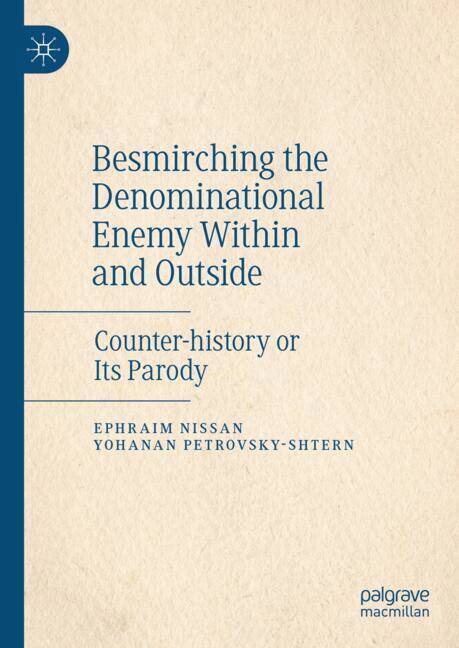
Door een staking bij bpost kan je online bestelling op dit moment iets langer onderweg zijn dan voorzien. Dringend iets nodig? Onze winkels ontvangen jou met open armen!
- Afhalen na 1 uur in een winkel met voorraad
- Gratis thuislevering in België vanaf € 30
- Ruim aanbod met 7 miljoen producten
Door een staking bij bpost kan je online bestelling op dit moment iets langer onderweg zijn dan voorzien. Dringend iets nodig? Onze winkels ontvangen jou met open armen!
- Afhalen na 1 uur in een winkel met voorraad
- Gratis thuislevering in België vanaf € 30
- Ruim aanbod met 7 miljoen producten
Zoeken
Besmirching the Denominational Enemy Within and Outside
Counter-History or Its Parody
Ephraim Nissan, Yohanan Petrovsky-Shtern
Hardcover | Engels
€ 105,45
+ 210 punten
Omschrijving
Counter-hagiography and counter-biography besmirch foundational figures held dear by different religious, political, or social groups. Such phenomena figure prominently in the history of religion and conflicts. For example, what we know of the Mazdakite revolution in pre-Islamic Iran/Iraq comes from revilers. The anti-Judaic polemicist from ninth-century Afghanistan and Iraq, Hiwi ("Snake"), was actually called Ḥəyyāwī (still a name among Iraqi Jews). The reputation of the great Haskalah (Jewish Enlightenment) thinker Moses Mendelssohn was damaged among the Orthodox by how Haskalah extremists portrayed him in their image. In 1869, a Genoan politician, Cesare Cabella, fulminated against Esther and Mordecai. In the Letter of Haman in rabbinic homiletics, Jews parodized hostile representations of their sacred history. Gerson Rosenzweig parroted in his 1892 talmudic-style Tractate America, anti-immigrant rhetoric from New York newspapers. Roman-age rabbis responded to claims about the protagonist of the Book of Joshua, "Joshua the Robber" as per a North African inscription early Byzantine Procopius of Caesarea alleged to have seen.
Specificaties
Betrokkenen
- Auteur(s):
- Uitgeverij:
Inhoud
- Aantal bladzijden:
- 378
- Taal:
- Engels
Eigenschappen
- Productcode (EAN):
- 9783031460685
- Verschijningsdatum:
- 23/08/2024
- Uitvoering:
- Hardcover
- Formaat:
- Genaaid
- Afmetingen:
- 156 mm x 212 mm
- Gewicht:
- 625 g

Alleen bij Standaard Boekhandel
+ 210 punten op je klantenkaart van Standaard Boekhandel
Beoordelingen
We publiceren alleen reviews die voldoen aan de voorwaarden voor reviews. Bekijk onze voorwaarden voor reviews.











